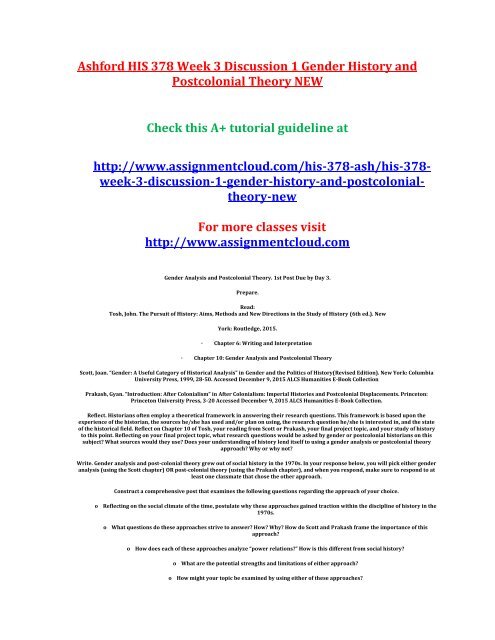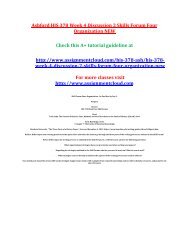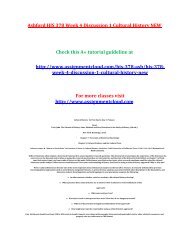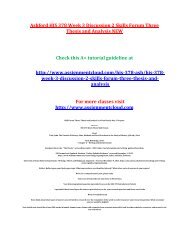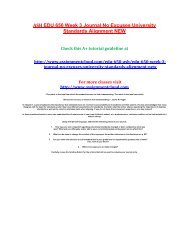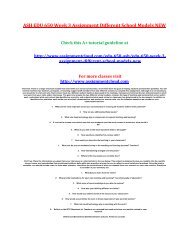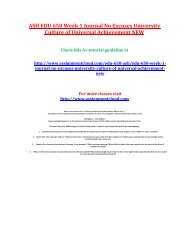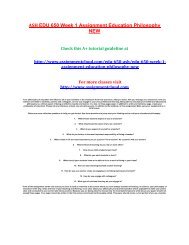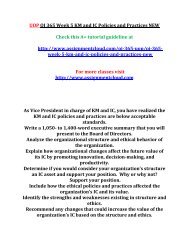Ashford HIS 378 Week 3 Discussion 1 Gender History and Postcolonial Theory NEW
his 378,ash his 378,his 378 entire course new,ash his 378 week 1,ash his 378 week 2,ash his 378 week 3,ash his 378 week 4,ash his 378 week 5,his 378 discussion,his week 5 final project,ash his 378 tutorials,ash his 378 assignments,his 378 help
his 378,ash his 378,his 378 entire course new,ash his 378 week 1,ash his 378 week 2,ash his 378 week 3,ash his 378 week 4,ash his 378 week 5,his 378 discussion,his week 5 final project,ash his 378 tutorials,ash his 378 assignments,his 378 help
You also want an ePaper? Increase the reach of your titles
YUMPU automatically turns print PDFs into web optimized ePapers that Google loves.
<strong>Ashford</strong> <strong>HIS</strong> <strong>378</strong> <strong>Week</strong> 3 <strong>Discussion</strong> 1 <strong>Gender</strong> <strong>History</strong> <strong>and</strong><br />
<strong>Postcolonial</strong> <strong>Theory</strong> <strong>NEW</strong><br />
Check this A+ tutorial guideline at<br />
http://www.assignmentcloud.com/his-<strong>378</strong>-ash/his-<strong>378</strong>-<br />
week-3-discussion-1-gender-history-<strong>and</strong>-postcolonialtheory-new<br />
For more classes visit<br />
http://www.assignmentcloud.com<br />
<strong>Gender</strong> Analysis <strong>and</strong> <strong>Postcolonial</strong> <strong>Theory</strong>. 1st Post Due by Day 3.<br />
Prepare.<br />
Read:<br />
Tosh, John. The Pursuit of <strong>History</strong>: Aims, Methods <strong>and</strong> New Directions in the Study of <strong>History</strong> (6th ed.). New<br />
York: Routledge, 2015.<br />
· Chapter 6: Writing <strong>and</strong> Interpretation<br />
· Chapter 10: <strong>Gender</strong> Analysis <strong>and</strong> <strong>Postcolonial</strong> <strong>Theory</strong><br />
Scott, Joan. “<strong>Gender</strong>: A Useful Category of Historical Analysis” in <strong>Gender</strong> <strong>and</strong> the Politics of <strong>History</strong>(Revised Edition). New York: Columbia<br />
University Press, 1999, 28-50. Accessed December 9, 2015 ALCS Humanities E-Book Collection<br />
Prakash, Gyan. “Introduction: After Colonialism” in After Colonialism: Imperial Histories <strong>and</strong> <strong>Postcolonial</strong> Displacements. Princeton:<br />
Princeton University Press, 3-20 Accessed December 9, 2015 ALCS Humanities E-Book Collection.<br />
Reflect. Historians often employ a theoretical framework in answering their research questions. This framework is based upon the<br />
experience of the historian, the sources he/she has used <strong>and</strong>/or plan on using, the research question he/she is interested in, <strong>and</strong> the state<br />
of the historical field. Reflect on Chapter 10 of Tosh, your reading from Scott or Prakash, your final project topic, <strong>and</strong> your study of history<br />
to this point. Reflecting on your final project topic, what research questions would be asked by gender or postcolonial historians on this<br />
subject? What sources would they use? Does your underst<strong>and</strong>ing of history lend itself to using a gender analysis or postcolonial theory<br />
approach? Why or why not?<br />
Write. <strong>Gender</strong> analysis <strong>and</strong> post-colonial theory grew out of social history in the 1970s. In your response below, you will pick either gender<br />
analysis (using the Scott chapter) OR post-colonial theory (using the Prakash chapter), <strong>and</strong> when you respond, make sure to respond to at<br />
least one classmate that chose the other approach.<br />
Construct a comprehensive post that examines the following questions regarding the approach of your choice.<br />
o<br />
Reflecting on the social climate of the time, postulate why these approaches gained traction within the discipline of history in the<br />
1970s.<br />
o<br />
What questions do these approaches strive to answer? How? Why? How do Scott <strong>and</strong> Prakash frame the importance of this<br />
approach?<br />
o<br />
How does each of these approaches analyze “power relations?” How is this different from social history?<br />
o<br />
What are the potential strengths <strong>and</strong> limitations of either approach?<br />
o<br />
How might your topic be examined by using either of these approaches?
Your initial post should be at least 250 to 300 words in length. Support your claims with examples from required material(s)<br />
<strong>and</strong>/or other scholarly resources, <strong>and</strong> properly cite any references in CMS format.


